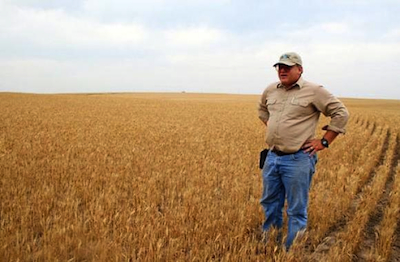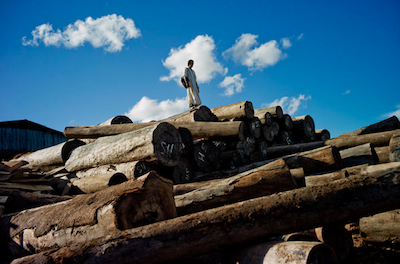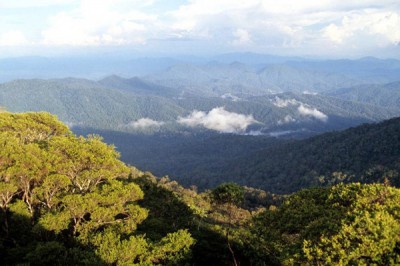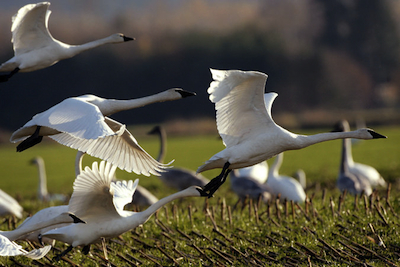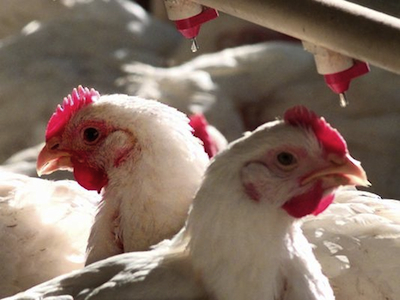
You may forward Planet Waves Monsanto Eco to your friends. They can sign up for this free environmental newsletter from Planet Waves. View this edition as a webpage. Dear Friend and Reader: Monsanto appears to be settling a lawsuit with a group of Kansas farmers who claim that 'zombie' GMO wheat contaminated their fields, according to a TakePart report Sept. 12.
While the deal still needs to be finalized, agriculture experts already see this settlement as a positive step in liability litigation against the biotech industry giant. "Monsanto never settles unless they're seriously vulnerable, and the farmers and lawyers involved in this case should reject any settlement," said Dave Murphy of Food Democracy Now. "Contamination of farmers' crops has been an integral part of Monsanto's business plan, and these farmers need to gain strong legal protections from future contamination events, which are happening daily in farmers' fields all over the world." Guatemalan Court Repeals 'Monsanto Law' Ten days of widespread protests in Guatemala City have led to a victory against Monsanto, reported Upside Down World Sept. 11. On Sept. 4, a Guatemalan court repealed the "Monsanto Law." Approved in June 2014, it would have given exclusivity on patented seeds to several transnational corporations -- thereby violating the Mayan people's right to traditional cultivation of their land. "This law is an attack on a traditional Mayan cultivation system which is based on the corn plant but which also includes black beans and herbs; these foods are a substantial part of the staple diet of rural people," said Antonio González from the National Network in Defense of Food Sovereignty and Biodiversity at a press conference Aug. 21. Illegal Peruvian Loggers Allegedly Resorting to Murder
One local man said the victims were tied up and shot in front of several villagers. Police have now visited Pucallpa, the region's capital, to investigate; there are no police stations in the area. Henderson Rengifo, of Peru's indigenous federation Aidesep, told the newspaper: "There's so much corruption in the regional governments that these logging mafias can kill our brothers with impunity." Commercial Agriculture Undermines Local Law Enforcement Commercial agriculture may be responsible for about 70 percent of all deforestation -- half of which is illegal -- according to a New Scientist article published Sept. 11. Sam Lawson, a consultant on forests whose research is cited, estimates that $61 billion per year is made from the produce of illegally deforested land, half of which is exported to the developed world. Unlawful logging may account for as much as 80 percent of such activities in Indonesia between 2010 and 2012.
In addition to reducing habitat for birds and countless other wildlife species, illegal deforestation also hinders Earth's ability to mitigate global warming. Audubon Society Predicts Global Warming Effects on Birds Almost half of all U.S. bird species could be threatened this century by the effects of global warming, according to a recent study published by the National Audubon Society, The New York Times reported Sept. 8. Many birds will be forced to manage in shrinking habitats or locate new ones; 30 species stand to lose about 90 percent of their current territory. The article quoted David Yarnold, the Society's president: "With these kinds of findings, it's hard to believe we won't lose some species to extinction. How many? We honestly don't know." The conclusions were based on UN climate predictions and the Society's own substantial bird survey data.
Drought Matrix: Birds, Mosquitoes, West Nile Virus California's drought, according to experts, has turned the state into the country's hot spot for West Nile virus, reported The Wall Street Journal Sept. 10. The virus, spread through the bite of mosquitoes, has claimed nine lives this year in the state of California -- with 238 cases reported in humans as of last week, compared to 117 last year. Experts claim that the reduction in the number of natural water sources for virus-carrying birds forces them to mingle with mosquitoes. "Drought does appear to contribute to elevated West Nile activity, because it does bring birds and mosquitoes together," said Roger Nasci, chief of the arboviral diseases branch for the Centers for Disease Control and Prevention. This means that the end of summer generally leads to an escalation of infections. Officials are urging people to avoid 'hot spots' until the weather cools down, as temperature increases lead to a proliferation of mosquitoes. Currently Orange County is ground zero of the outbreak; there are no drugs or vaccines that can combat the virus at this time. Perdue Drastically Reduces Antibiotic Use in Chickens After beginning to phase out antibiotic use on its chickens 12 years ago, Perdue Farms -- the third-largest chicken producer in the U.S. -- announced that it has ceased using most antibiotics in its chicken production, Wired reported Sept. 3.
Surprisingly, Perdue's moves go beyond the FDA's regulations, which have been criticized by food safety groups for being voluntary. Company chairman Jim Perdue said at a briefing in Washington, DC, that direct communication from concerned consumers was a key factor in the decision: "Coupled with information coming from the USDA and FDA and other sources, we began to look critically at our practices. It wasn't easy," he added, "but we found along the way that we could raise healthy chickens with fewer antibiotics." Translation: tell chicken (and other meat producers) that you won't buy their product unless they follow Perdue's lead -- and exceed their efforts. Then follow through. Yours & truly, Amanda Painter and the ECO editorial team P.S. Just a reminder that if you're in the greater NYC area, the People's Climate March is this Sunday, Sept. 21 -- and there are ways to go beyond the march and engage in direct action. If you go to the march, please send any photographs and first-hand impressions to us at eco@planetwaves.net. You may forward Planet Waves Monsanto Eco to your friends. They can sign up for this free environmental newsletter from Planet Waves. View this edition as a webpage. Planet Waves Monsanto Watch (ISSN 1933-9135) is published each Tuesday evening in Kingston, New York by Planet Waves, Inc. Publisher: Eric Francis Coppolino. Editor: Amanda Painter. Business Manager: Chelsea Bottinelli. Web Developer: Anatoly Ryzhenko. Research, Writing and Editing: Planet Waves Monsanto Watch is produced by a team consisting of Elizabeth Michaud, Amanda Painter, Amy Elliott, Carol van Strum, Len Wallick and Chad Woodward. Love A Libra? Pre-Order the Libra Birthday Reading Dear Friend and Reader: Next week is the equinox, when the Sun enters Libra and we begin a new season. But before we get there, you can pre-order the upcoming Libra Birthday reading for half the published price.
It consists of two astrology sessions and a tarot session, plus a live call-in discussion (date TBA; the discussion is recorded for those who cannot attend the live event). These conference calls have been a productive and fun way to learn about astrology and how it affects us. You also get access to last year's reading to check Eric's accuracy, and to review the past few seasons. In addition, your reading includes an extended written sign description. I invite you to take advantage of some helpful, eloquent and spot-on astrology at an incredible value -- or share it with a loved one as a birthday gift. Here is your half-price pre-sale offer. Yours & truly, Amanda Painter To unsubscribe, click here e Wiki | Friends | Editors | Contact Us Copyright © 2013 by Planet Waves, Inc. All Rights Reserved. Other copyrights may apply. Some images used under Fair Use or Share Alike attribution. |
